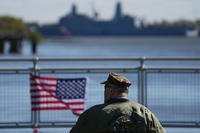China pushed back against U.S. pressure to stop its activity in the South China Sea Sunday, insisting that it has sovereignty over most of the disputed territory in the region and saying it "has no fear of trouble."
Chinese Admiral Sun Jianguo said China will not be bullied in the South China Sea and will not back down over a pending U.N. ruling over its claims in a vital trade route.
"We do not make trouble, but we have no fear of trouble," Sun said at Asia's biggest security summit in Singapore, where more than 600 security, military and government delegates had gathered over three days, Reuters reported.
"China will not bear the consequences, nor will it allow any infringement on its sovereignty and security interest, or stay indifferent to some countries creating chaos in the South China Sea," Sun said.
The South China Sea has become a hotly contested issue for the U.S. and China. Both sides have traded accusations of militarizing the strategic waterway as China continues its buildup of artificial islands and constructed airfields and lighthouses on top of some of them.
Secretary of Defense Ash Carter warned Beijing Saturday at the summit that Beijing risks creating a "great wall of self-isolation" if it continues its militarization of the South China Sea.
"There is growing anxiety in this region, and in this room, about China's activities on the seas, in cyberspace, and in the region's airspace," he said. "Indeed, in the South China Sea, China has taken some expansive and unprecedented actions, that have generated concerns about China's strategic intentions."
Secretary of State John Kerry spoke in Mongolia early Sunday and lectured China against establishing an air defense zone in the South China Sea. He said it would be a "provocative and destabilizing act."
Furthermore, Kerry said such an action would raise tension between China and its Asian neighbors and undermine China's commitment to diplomatically resolve disputes over islands and maritime claims. The matter is likely to be a major focus of discussions in the next days.
Sun rejected the notion that China is isolating itself, saying that many of its neighbors at the security summit were "warmer" and "friendlier" to China than last year.
"We were not isolated in the past, we are not isolated now and we will not be isolated in the future," Sun said. "Actually I am worried that some people and countries are still looking at China with the Cold War mentality and prejudice. They may build a wall in their minds and end up isolating themselves."
The Associated Press contributed to this report.






























